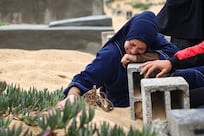The latest push by the Abu Dhabi government to prioritise the medical well-being of citizens and residents is a welcome step for residents of the Emirate. It was reiterated on Wednesday that all hospitals, public or private, must treat emergencies regardless of how extensively the patients are covered by health insurance or the money they have on them when they reach the hospital. There can be no delay in treating urgent medical cases.
In Abu Dhabi, hospitals were already required to treat patients regardless of their medical cover. This was following an order from the health authorities several years ago. But Wednesday’s renewed commitment to aid those in the midst of medical emergencies will make all the difference between a life saved and a life lost.
It is unconscionable that any hospital would turn away a person requiring urgent medical treatment on the grounds of inadequate insurance or not enough cash at hand. For most people, these are commonly felt anxieties. Misfortune could befall anyone, be it a car crash or other traumas where emergency medical response is of the essence. There can be no time wasted in scrutinising the validity of insurance cards. And treatment must begin even if the entire amount is not paid up front, in one go.
A circular was sent to “all health service providers in Abu Dhabi emirate, reiterating the importance of receiving/treating all emergency cases – regardless of validity of the insurance cards – and to ensure that hospitals are prepared to accept or refer necessary cases,” Abu Dhabi Government Media Office said on Wednesday.
Indeed, when documentation and incomplete payment snatch precious minutes and lives drain away in that time, our humanity is compromised and we as a collective fail. In preventing that from becoming the norm, and putting in place measures for circumstances to not come to that, credit is due to Abu Dhabi’s government for this compassionate approach.
It has to be borne in mind, however, that medical insurance regulations are not the same in all emirates. In 2006, Abu Dhabi introduced mandatory health insurance and the city bore the distinction of providing the most comprehensive cover for the average resident. It is provided by employers and their employees' families are typically covered. It entitles someone to Dh250,000 of care. Dubai's mandatory health insurance – introduced in 2015 – stipulates that employees, their dependents and domestic helpers are entitled to Dh150,000 per year of treatment. Medical insurance packages can also vary significantly in terms of the cover provided.
Employers in the Northern Emirates are not legally bound to pay for their employees' insurance. However, the best employers know that providing health insurance is an investment both for the employer and their people.
In Abu Dhabi, residents have significant advantages: state-of-the-art medical facilities have either opened recently or are soon due to. Four months ago, for example, the Specialised Rehabilitation Hospital opened its doors. Neurological disorders are able to be treated at the facility, such as the almost unheard of Guillain-Barré syndrome.
By all accounts, Abu Dhabi’s medical capacities are only burgeoning. Next month, the Mayo Clinic is set to be fully operational. It will be equipped to treat cancer, bone marrow transplants and several other advanced medical conditions. Alongside the capital’s public hospital operator Seha, Mayo Clinic will jointly run Abu Dhabi’s new mega hospital, Sheikh Shakhbout Medical City, which, again, will be fully operational in January. Its chief medical officer, Dr Abdul Majeed Al Zubaidi, had said the hospital was a “centre of excellence when it comes to trauma and burns”, which is what people need and where they should be able to go if a circumstance should arise.
These new pioneering medical facilities go a long way to reassure residents that there is excellent medical care at hand and in the case of emergencies, it is in fact accessible.
Abu Dhabi’s reiteration that allows everyone in emergencies to access stellar medical care has done people facing the misfortune of medical crises an immeasurable good. By broadening crucial access to some of the best health care in the region, Abu Dhabi has prioritised the well-being of all its residents.





